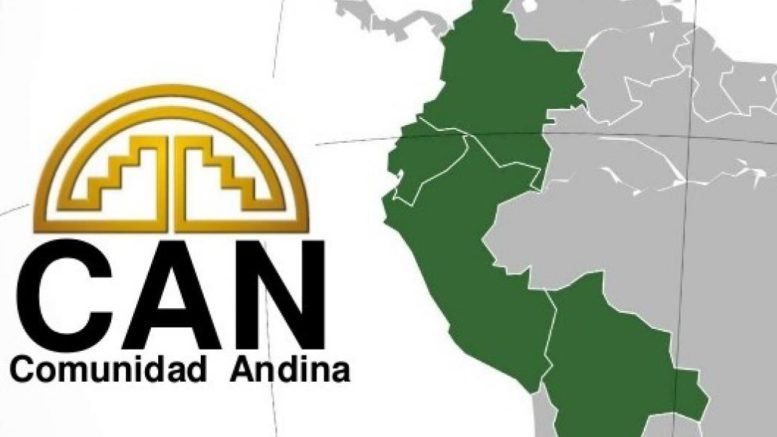An outline by Christopher Lavado Villegas.
Together, the member countries of the Andean Community, Peru, Bolivia, Colombia and Ecuador, have an important source of income in agriculture. The Andean Technical Committee on Agricultural Health, integrated with the same official services of its member countries, developed common standards and programs to combat phytotechnical risks for agriculture. Thus, the Andean integration process ensured a wide range of laws in order to guarantee phytosanitary security in the region, and among them are the rules that regulate the registration of pesticides.
Resolution 630 of the Andean Technical Registration Manual establishes the requirements and conditions that must be met to obtain title in a member country. With the registration of the PQUA, the authorities of each country carry out evaluation processes and determine the permitted agronomic limits of the products.
Currently, the Andean Community is recognized by the International Plant Protection Convention. This recognition allows participation in the standard definition processes of the convention and to interact with its governance bodies, in addition to being a protagonist in the dissemination of the year 2020 as the international year of plant health.

Christopher Villegas
Christopher Lavado Villegas in this article for AgriBrasilis, presents an analysis of the most important aspects for pesticide registration in the Andean Community countries. Christopher is a graduate of the La Molina National Agrarian University in Peru, with an MBA from the ESAN Graduate Business School and a specialization in Marketing at the Technological Institute of Monterrey in México, and today he is the commercial manager of the Peruvian consulting firm Farbic Consultores EIRL.
Agricultural pesticides help protect production from the attack of crop pests and diseases, however commercial pesticide activities are regulated under current legislation that govern countries, regions and international guidelines.
According to projected information from the FAO, world trade in pesticides reached a value of US$ 80.2
billion in 2019 and only in imports US$ 40.6 billion. In South America, the estimated value of imports was US$ 6.2 billion, which represented 15.2% of the world total. The member countries of the Andean Community (CAN): Peru, Ecuador, Colombia and Bolivia, together reached an estimated import value of US$ 1.2 billion, which represents 19% compared to South America and 3% compared to world imports.
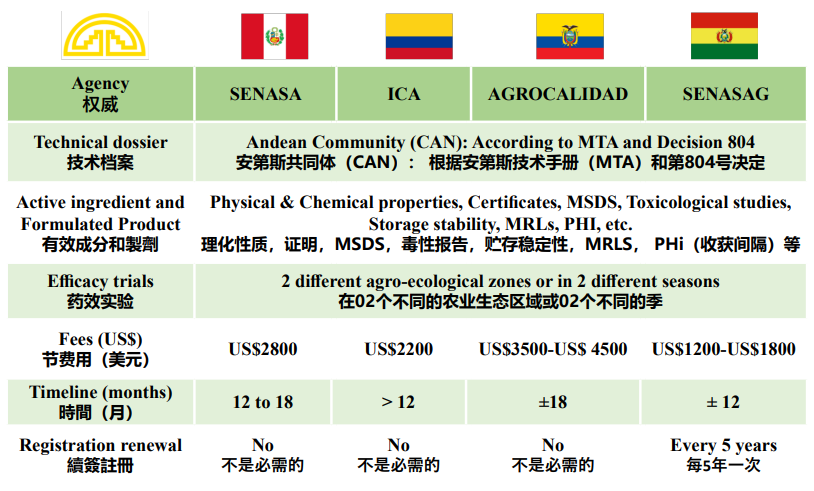
PERU
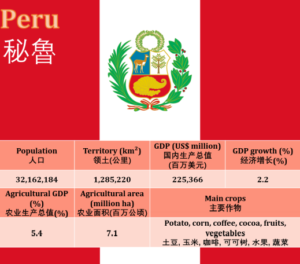 The regulation of the pesticide trade is in charge of the National Agrarian Health Service (SENASA), the national authority that directs regulatory policies taking as reference the requirements of the Andean Technical Manual (MTA)
The regulation of the pesticide trade is in charge of the National Agrarian Health Service (SENASA), the national authority that directs regulatory policies taking as reference the requirements of the Andean Technical Manual (MTA)
of the CAN. Actions for the Agricultural Pesticides Registration include the evaluation of technical files, as well as post-registration inspection actions. The evaluation of pesticides is complemented by the General Directorate of Agricultural Environmental Affairs, which reviews environmental risks and the General Directorate of Environmental Health and Food Safety, which reviews toxicological risks for human health; both organizations
direct their reports to SENASA.
The current technical regulations for the development of the registration processes are: Decision No. 804 (Andean Standard for the Registration and Control of Chemical Pesticides for Agricultural Use) and Resolution No. 2075 (MTA). For internal administrative processes, reference is made to the DS001-2020 MINAGRI and the National Pesticide Regulation DS001-2015 MINAGRI.
To register pesticides, you must previously have the import authorization registered with SENASA and
have a permanent technical advisor. Only formulated products are registered and the following processes must be followed: preparation of the technical file where all the information on the active ingredient and the product formulated based on the MTA guidelines is presented, and development of efficacy trials in the field to validate the product control.
The relevant information of the active ingredient and formulated product is: physical-chemical properties, certificates, MSDS, toxicological studies, storage stability, etc. Also the maximum residue limits and pre harvest interval of pesticides are critical points in the evaluation. All the technical information in the file must come from recognized official sources and the documents of the manufacturer or formulator must be legitimate.
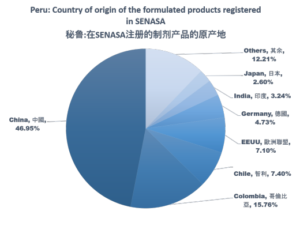
Efficacy trials define the effective pesticide control dose, are carried out in 2 different agro-ecological zones or in 2 different agricultural seasons. When pesticides are registered without registration antecedents in SENASA, an experimental test must be previously developed to document and registration the technical information and control behavior of the pesticide.
The estimated time for the authority to evaluate a registration is 1 to 1.5 year and the estimated cost of government fees for the process is US$ 2,800, this represents a challenge for companies that want to invest in registering pesticides for commercialization. Registrations have unlimited validity and there are currently more than 2900 registrations of chemical pesticides for agricultural use in SENASA. At the moment only pesticides are being registered, however, SENASA will soon finish implementing the procedures to register fertilizers.
ECUADOR
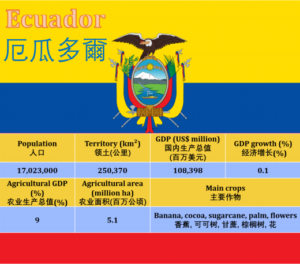 It is the Ecuadorian Agency for the Assurance of Agricultural Quality (AGROCALIDAD), the authority that regulates and regulates national policies for the pesticide trade. The regulations are established through Resolution No. 0262, a complementary standard to facilitate the application of Decision No. 804 of the CAN and the MTA (Resolution 2570).
It is the Ecuadorian Agency for the Assurance of Agricultural Quality (AGROCALIDAD), the authority that regulates and regulates national policies for the pesticide trade. The regulations are established through Resolution No. 0262, a complementary standard to facilitate the application of Decision No. 804 of the CAN and the MTA (Resolution 2570).
To register a chemical pesticide, the company must register with AGROCALIDAD and have a technical advisor. Once registered, the efficacy trials will be carried out that will be approved by Agrocalidad under established protocols.
Efficacy trials are carried out in two locations with different agroecological conditions or in the same location in different climatic seasons. The preparation of the file is according to the MTA and must contain all the technical requirements requested, both for the active ingredient and for the formulated product, that is: physical-chemical properties, certificates, toxicological studies, etc.
The estimated time for the agency to evaluate a pesticide registration submission is 1.5 year. The costs of government fees vary from US$ 3,500 to US$ 4,500 depending on the toxicological category of the pesticide. The Ministry of Public Health and the Ministry of the Environment also intervene, complementing the evaluation by reporting their reports to Agrocalidad. Here fertilizers and adjuvants are recorded. The registration is valid for an unlimited period.
COLOMBIA
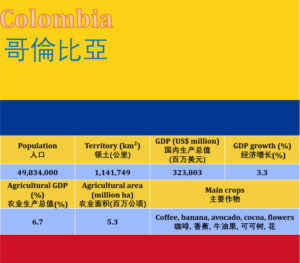 The internal regulations are directed by the Ministry of Agriculture and Rural Development through the Instituto Colombiano Agropecuario ICA, the competent national authority to keep the registration and control of chemical pesticides for agricultural use, under Resolution No. 03759 and for its application, they follow the guidelines of Decision
The internal regulations are directed by the Ministry of Agriculture and Rural Development through the Instituto Colombiano Agropecuario ICA, the competent national authority to keep the registration and control of chemical pesticides for agricultural use, under Resolution No. 03759 and for its application, they follow the guidelines of Decision
No. 804 and Resolution 2075 of the CAN.
The ICA coordinates with the National Institute of Health and the Ministry of Environment and Sustainable Development, the actions that must be applied for the control, surveillance
and management of pesticides. This group evaluates the technical and scientific information for the registration of chemical pesticides for agricultural use for their formal commercialization. They also monitor the safety and efficacy tests of agricultural pesticides for registration in accordance with current regulations.
The registration process begins by registering the company with the ICA and the Colombian Chamber of Commerce; and has a permanent technical advisor. The registration will be valid indefinitely. Likewise, the interested party must demonstrate that he has his own laboratory or has the services of one recognized by the authority.
The entire technical structure of the file follows the guidelines of the MTA that is complemented by Resolution No. 03759. All the technical information of the formulator and manufacturers must be available to be evaluated together with the efficacy trials. The estimated time for ICA to complete the assessment is more than 1 year. The approximate cost of government fees is US$2,200. The registration will be valid indefinitely.
BOLIVIA
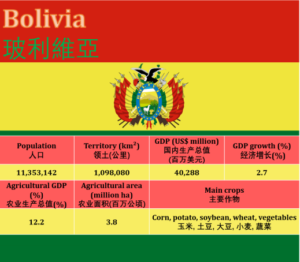 The Ministry of Rural Development and Lands and the General Executive Directorate of the National Service of Agricultural Health and Food Safety (SENASAG), formulated Administrative Resolution No. 07/2017 (Regulation for the Registration and Control of Chemical Pesticides for Agricultural Use), in application of Decision No. 804 and the complementary rule RM001/2016 in the national territory.
The Ministry of Rural Development and Lands and the General Executive Directorate of the National Service of Agricultural Health and Food Safety (SENASAG), formulated Administrative Resolution No. 07/2017 (Regulation for the Registration and Control of Chemical Pesticides for Agricultural Use), in application of Decision No. 804 and the complementary rule RM001/2016 in the national territory.
To register an agricultural pesticide, you must previously register with SENASAG and have the services of a qualified Technical Advisor. The efficiency tests are then carried out, under the supervision of SENASAG, the results of which accompany the technical file for the authority’s evaluation. SENASAG, in coordination with the Ministry of
Health and the Ministry of Environment and Water, evaluates the technical files for the favorable or unfavorable issuance of a registration, as in other cases, the requirements of the technical file follow the guidelines of the MTA, Where the technical documentation of the active ingredient and the formulated product is presented, together with the results of the efficacy trials in the field.
The estimated term for the evaluation of an agricultural pesticide registration by the authority is approximately 1 year. The estimated value of government fees for agricultural pesticide registration is US$ 1,200 to US$ 1,800. The registration will be valid for 5 years that must then be renewed, according to the guidelines of the MTA and taking into account toxicological criteria, chemical group and even SENASAG may request new efficacy trials.
Finally, current regulations will surely change over time due to the need to reduce risks to the environment and health, which is why the requirements for obtaining pesticide registrations are increasingly demanding, which is complemented by permanent surveillance compliance with postregistration activities.
Note: ¹ Portal de la Comunidad Andina

